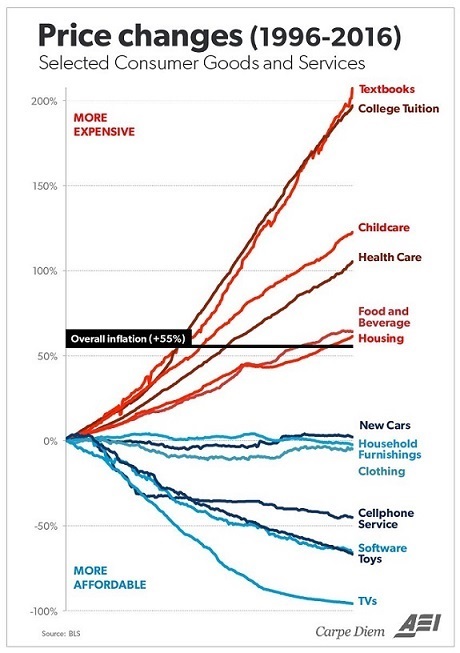The Path to Inflation: "Helicopter Money"
June 5, 2017
The general view in inflation is dead, essentially forever. Maybe. Maybe not.
We all know real-world inflation for big-ticket expenses is far above the official rate of around 2% annually.

Yet conventional economists are virtually unanimous that deflation is the danger and inflation is a "good thing" we need to spur so servicing existing debt becomes easier for debtors.
Due to the deflationary pressures of technology and stagnant wages for the bottom 90%, the consensus sees low inflation as far as the eye can see.
When the consensus is near-100% on one side of the boat, we can safely bet Reality will not conform to expectations. This leads to a question: what could cause official near-zero inflation to surprise the consensus and leap higher?
One possible answer is "helicopter money": money created by central banks that is distributed directly to households via tax rebates, debt forgiveness, or Universal Basic Income (UBI).
For the past 17 years, central banks have funneled credit and liquidity into the banks at the top of the wealth-power pyramid. Very little of this new "wealth" has trickled down to the bottom 90% of households in the real economy who have seen their earnings stagnate and their costs rise.
Now that debt and essentials are absorbing much of the bottom 90%'s earnings, there's little fuel left for additional debt-based consumption. This is why we see auto sales plummeting.
The only way the central banks/states can fuel more debt and spending is to drop "helicopter money" directly into the consumers' checking accounts.
Once they do this, the "new money" goes directly into the real economy. This is quite different than the past 17 years of monetary stimulus that went mostly into assets owned by the wealthy.
There's another driver of inflation: shortages of essential commodities. I define inflation very simply: a loss of purchasing power, which means we are paying more money for the exact same good or service.
If it took an hour of labor to buy X, and now it takes 2 hours of labor to buy X, that's a loss of purchasing power, i.e. inflation. This can be a monetary dynamic, i.e. a devaluation of a currency, but it's not restricted to monetary functions.
The world has been awash in cheap commodities for 20+ years. Other than the brief spike in oil in 2008, commodities have been relatively cheap and abundant. Grains have plumbed historic lows, for example.
The two are connected, of course; low energy costs reduce the costs of production of commodities.
But we've collectively forgotten that shortages can occur due to "perfect storms" of extended bad weather and political crises. At some point, humanity's luck will run out and key commodities will soar in price due to shortages.
These shortages could push prices much higher very quickly.
You see the conundrum facing central banks. very little of the trillions in new credit they created ended up in the hands of households. All the new money did was inflate asset bubbles in assets owned largely by the wealthy.
With earnings stagnate for years/decades, households have run out of rope to fund new purchases. Once the bottom 95% can no longer afford to borrow and spend more, the economy sinks into a self-reinforcing recession.
Creating more free money for financiers as central banks have done for 17 years won't solve this recession. Instead, it will anger the bottom 95% to see the wealthy's assets climbing ever higher. That anger translates into political discord.
But "helicopter money" has its own risks. To fund "helicopter money," governments will have to borrow trillions more from central banks. If this flood of new money pushes inflation higher, the interest rates governments will pay on future "helicopter money" will rise, squeezing all state spending as interest payments eat up more and more of the government's tax revenues. Eventually most of the tax revenues goes to paying interest, forcing the government to borrow trillions more just to maintain funding, which pushes interest higher, and so on.
The general view in inflation is dead, essentially forever. Maybe. Maybe not.
Bottom line: the next recession won't be "fixed" with the central bank playbook of
more free money for financiers.
If you found value in this content, please join me in seeking solutions by
becoming
a $1/month patron of my work via patreon.com.
Check out both of my new books, Inequality and the Collapse of Privilege ($3.95 Kindle, $8.95 print) and Why Our Status Quo Failed and Is Beyond Reform ($3.95 Kindle, $8.95 print, $5.95 audiobook) For more, please visit the OTM essentials website.
NOTE: Contributions/subscriptions are acknowledged in the order received. Your name and email remain confidential and will not be given to any other individual, company or agency.
|
Thank you, Blaise S. ($20), for your magnificently generous contribution to this site -- I am greatly honored by your steadfast support and readership. |
Thank you, Mark H. ($25), for your splendidly generous contribution to this site -- I am greatly honored by your steadfast support and readership. |

Discover why Iím looking to retire in a SE Asia luxury resort for $1,200/month. |